
On June 2-3, 2016, the Computer History Museum launched its new Exponential Center, the first museum institution devoted to capturing the legacy—and advancing the future—of Digital Age entrepreneurship and innovation in Silicon Valley and around the world. On Thursday, June 2, 250 innovators, entrepreneurs, and executives gathered for the evening gala, titled “From 1 to 1 Billion: Celebrating the Founders and Builders of the Digital Age.”
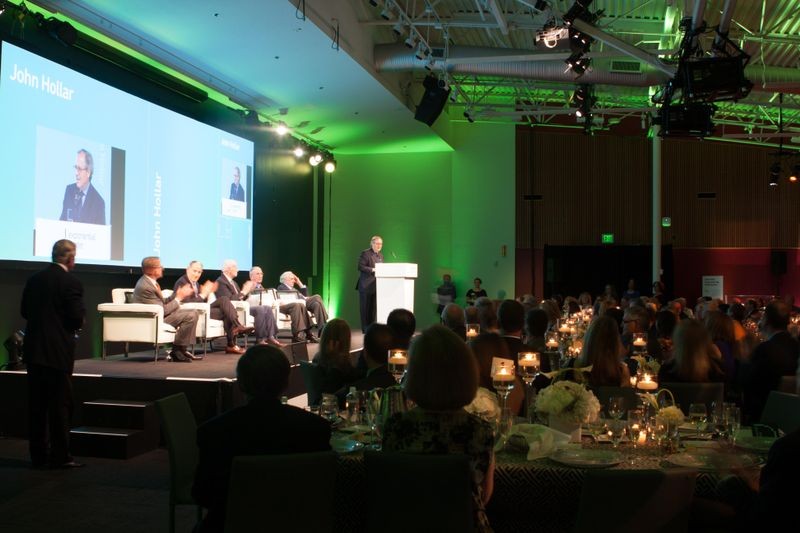
Full house at launch gala listens to Museum President and CEO John Hollar
“Entrepreneurs and computing go hand in hand. Across the world, people want to understand why that is, how it happens, what is special about the way it works in Silicon Valley, and how past entrepreneurship and innovation connects to the future,” said John Hollar, the Museum’s president and CEO. “The Exponential Center is preserving history, making forward-looking connections, and inspiring next generation entrepreneurs, innovators and leaders.”
Many historians consider the Digital Age the most transformational era in recorded human history—unprecedented in its capacity and power to change human experience in pace, personalization, scope, and scale. The core driving force for change in this era is the combination of innovation and entrepreneurship. Each alone is potent; multiplied together they can create exponential progress. The result: technological innovation, economic value creation, and social impact affecting billions of people and how we live, work, and play each day.

Announcing new Exponential Center at CHM
For the past half century, Silicon Valley has been epicenter and model for this exponential change, from the 1960s with Fairchild which spawned the $360 billion semiconductor industry to Facebook which now serves more than 1 billion users each day. Today entrepreneurs and national policymakers alike consider Silicon Valley a state of mind for this phenomenon, now global in both its impetus and impact.
The Exponential Center’s work underway focuses on five key initiatives: collections and exhibitions, research and insights, education, live programming, and thought leadership. To capture the legacy of the past, we are actively expanding, preserving, and sharing the collection of artifacts and oral histories as a public treasure for generations to come. To support next generation entrepreneurs and change-makers, we are creating dynamic events, innovative educational digital content, and a vital community. With the passing this year of technology and venture pioneers, including Andy Grove, Bill Campbell, Tom Perkins, Gene Amdahl, David Morgenthaler and others, the urgency of this work has never been more apparent.
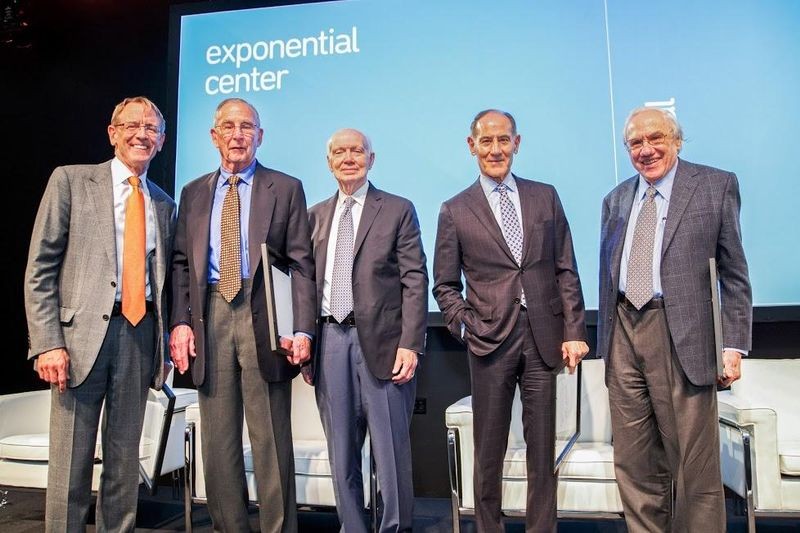
2016 Exponential Center honorees: John Doerr, Arthur Rock, Regis McKenna, Larry Sonsini, Jay Last, and Gordon Moore (not pictured)
The gala convened pioneering leaders who built legendary companies from key industry sectors over the past half century, including semiconductors, computing, software, the internet, social, mobile, and beyond as well as vital supporting institutions that have made entrepreneurial success possible. What a privilege to honor a singular set of six pioneers who established the technological and entrepreneurial foundation for Silicon Valley and beyond in the Digital Age.
The gala recognized distinguished honorees Gordon Moore (Intel co-founder), Jay Last (Fairchild Semiconductor co-founder), Arthur Rock (Arthur Rock & Co.), Regis McKenna (Regis McKenna Inc.), Larry Sonsini (Wilson Sonsini Goodrich & Rosati chairman), and John Doerr (Kleiner Perkins Caufield & Byers chair).
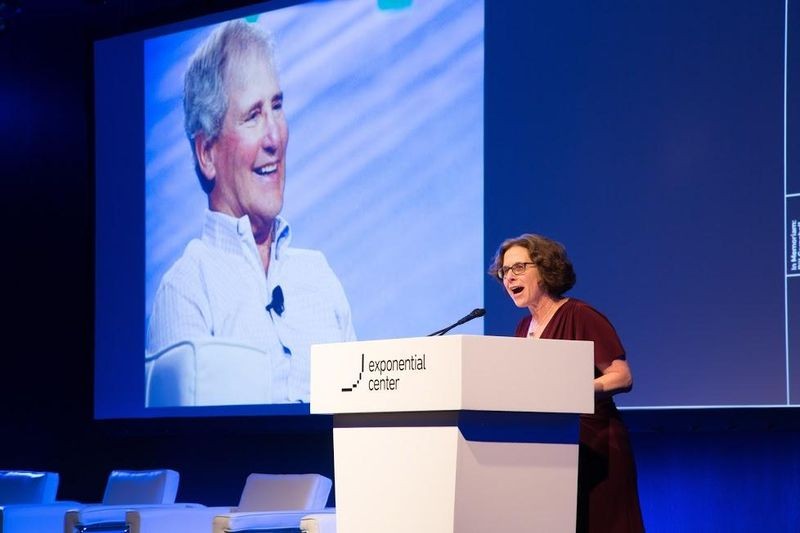
Numenta CEO Donna Dubinsky shares tribute in honor of Intuit’s Bill Campbell
Memorable and moving tributes honoring Intuit CEO Bill Campbell and Intel co-founder and CEO Andy Grove were given by Numenta CEO Donna Dubinsky and Breyer Capital CEO Jim Breyer.
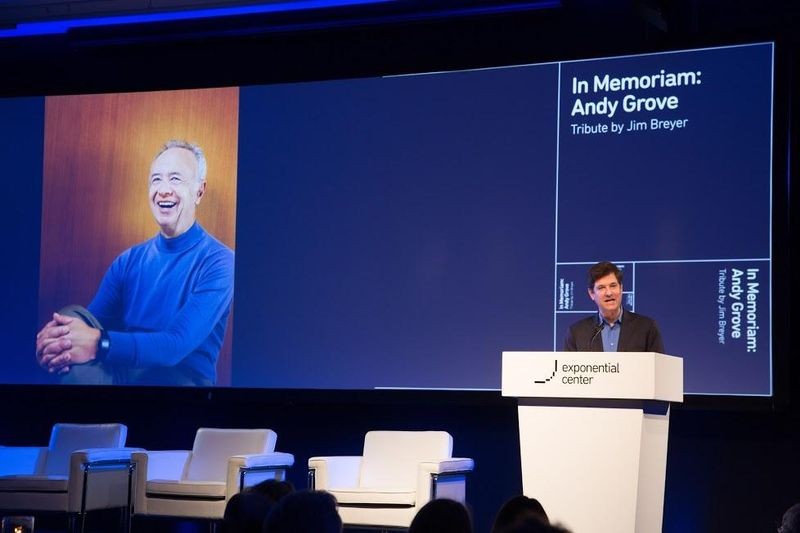
Jim Breyer, CEO of Breyer Capital, gives a tribute in honor of Intel founder Andy Grove
Gala attendees represented founders, early team members, funders, executives, and board members involved in a total of more than 400 companies, including Fairchild, Intel, Google, Apple, Cisco, Microsoft, Motorola, Intuit, NVIDIA, SanDisk, Sunpower, 23andme, Intuitive Surgical, and Kiva.

Kim Polese, Cristina Morgan, Heidi Roizen, MJ Elmore, and Ann Doerr at Exponential launch
Managing partners and senior leaders also participated from leading institutions in the entrepreneurial ecosystem, such as Stanford and UC Berkeley, Draper Fisher Jurvetson, Khosla Ventures, NEA, Sequoia, Fenwick & West, Wilson Sonsini, and Joint Venture Silicon Valley.

“Radical Empathy” is the key, according to Julie Hanna, founder and executive chair of the board at Kiva
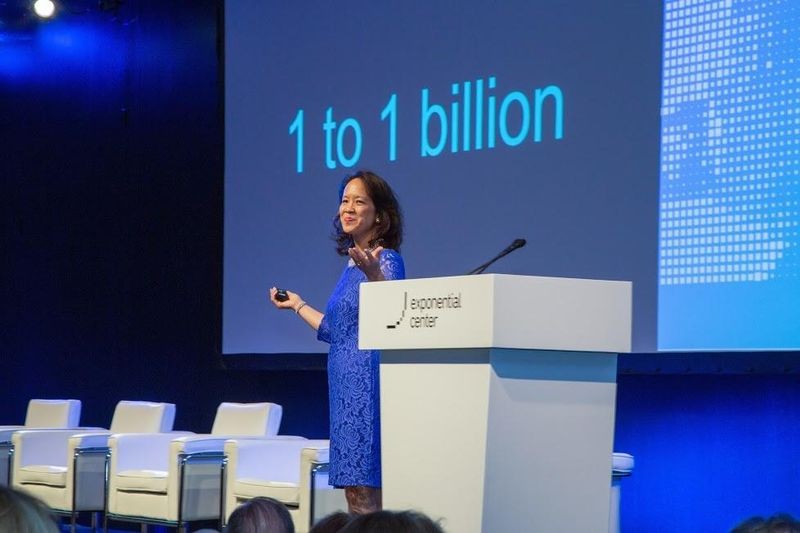
Exponential Center Executive Director Marguerite Gong Hancock shares the center’s mission
These luminaries and the firms they have created represent the exponential stories of the evening’s theme of “1 to 1 billion”. We surprised gala attendees by revealing 8 artifacts that represented iconic stories of exponential growth, from 1 idea or 1 person to impacts on 1 billion technology devices, 1 billion dollars (or more), or 1 billion people. One set of engineering notebooks at Fairchild led to the semiconductor industry, now powering billions of devices from smart phones to satellites to self-driving cars. One business plan led to Apple, the most valuable company on NASDAQ with a market capitalization of more than $500 billion. One college brainchild became Facebook, used by over a billion people worldwide.
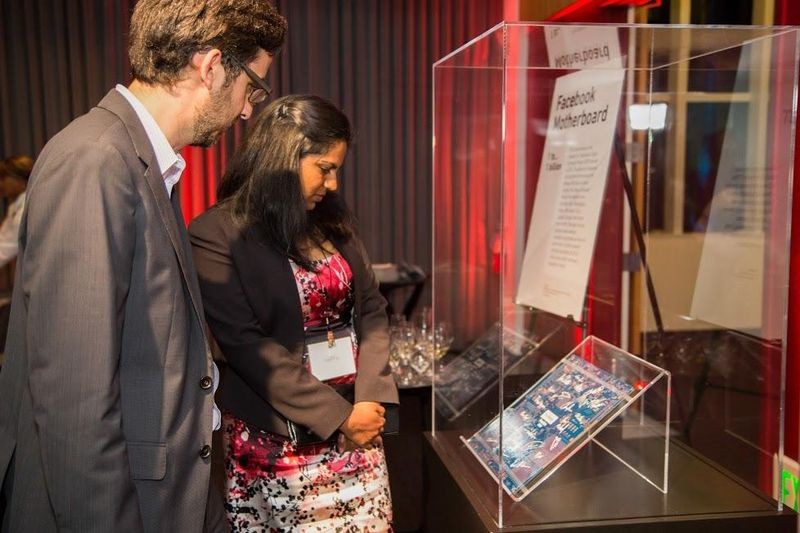
Special displays of artifacts from eight legendary firms illustrate exponential impact
How do you sum up the spirit of the pioneering founders and builders of transformative companies? One participant, an executive at a multi-billion dollar firm at the intersection of robotics and health, shared a Facebook post the next day: “Last night at the launch gala for the Computer History Museum’s Exponential Center. The honorees were some of Silicon Valley’s titans… who were instrumental in building the culture of entrepreneurship….The audience was as amazing, representing a few more from that first wave, and much of the second wave (“oh look, there’s Woz…”).
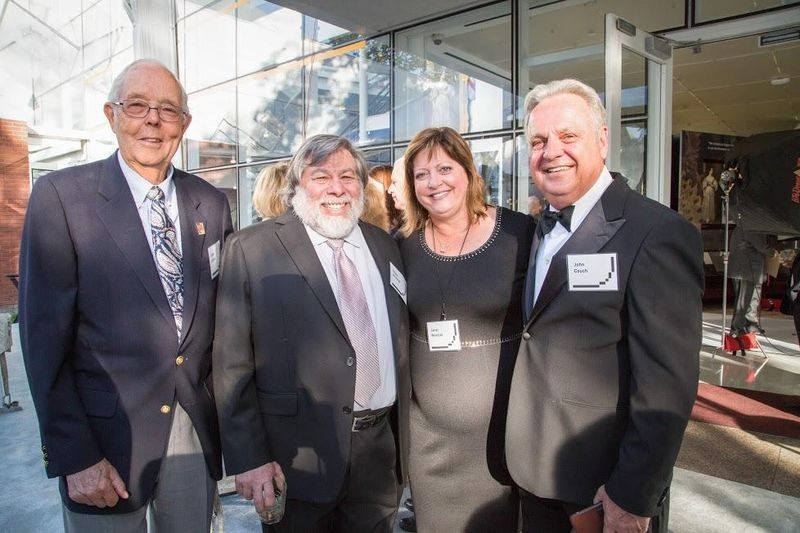
Apple reunion: employee #14 Gene Carter, co-founder Steve and Janet “Woz,” and VP of Education John Couch
She continued: “This is part of what is so amazing about exponential change. The origins of Silicon Valley were wandering around the room, and the changes brought on by the digital age have happened so rapidly that it was possible for them to be alive to see the worldwide effects of the things they had done….”
The evening ended on a celebratory note with a toast–to the honorees and other extraordinary circle of founders and builders gathered for the sparkling evening, to the Exponential Center and its promising work, and to the entrepreneurs and change-makers to come.
As John Doerr, one of our 2016 honorees summed up: “What we know and what we believe about Silicon Valley is the following: Silicon Valley is not a place. It is a state of mind. It can be everywhere. It can uplift everyone. That is the idea of Exponential.”
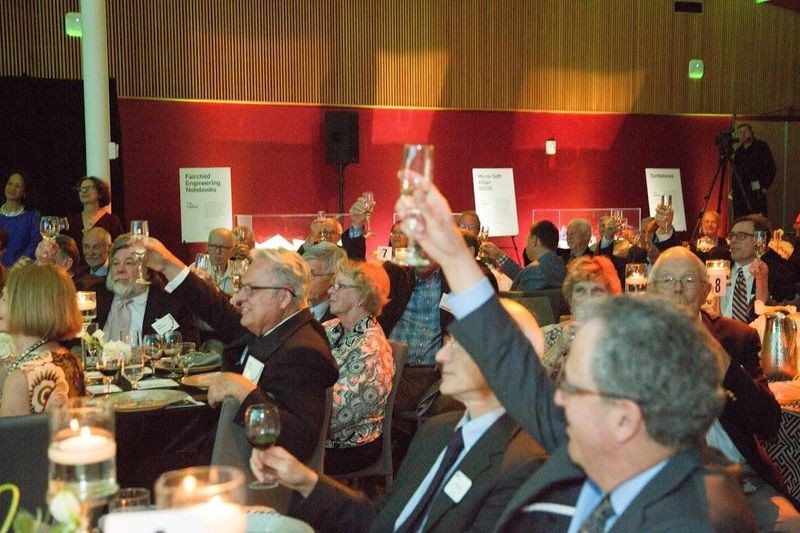
Attendees, representing more than 400 pioneering companies during the past 60 years, toast the Exponential Center
Exponential impact comes from great people and organizations connecting. We’re building an amazing community of participants and partners focused on entrepreneurship for creating technological, economic, and social impact.
I warmly invite you to learn more about our exciting plans for the year ahead. I look forward to welcoming your participation and hearing your thoughts.
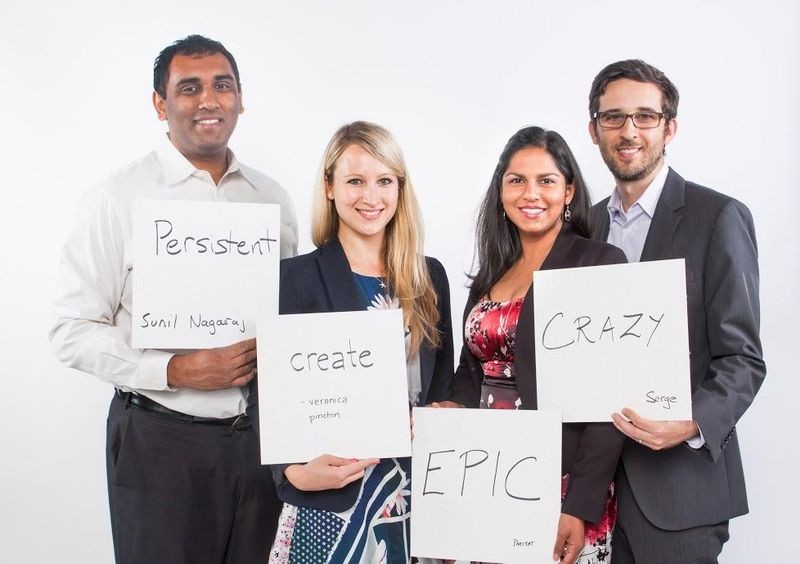
CHM’s NextGen Advisory Board members: Sunil Nagaraj (Bessemer Venture Partners), Veronica Pinchin (Google), and Serge Grossman (Google)
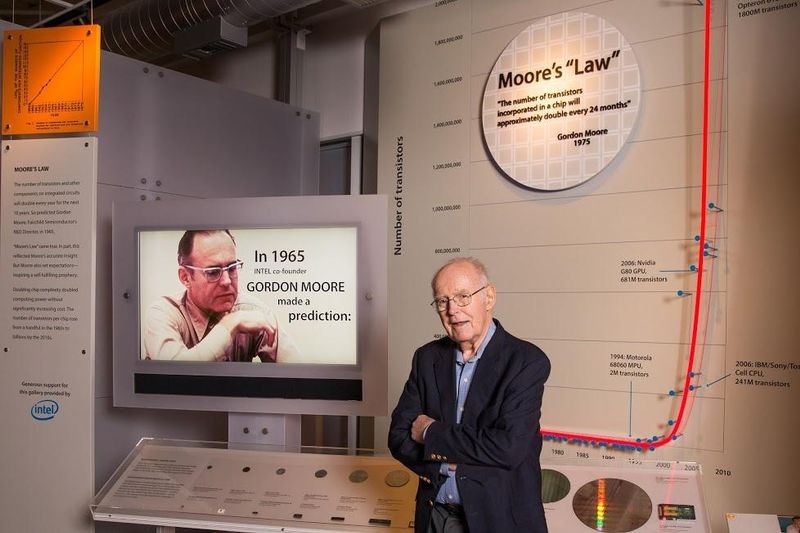
Gordon Moore in front of Moore’s Law exhibit in CHM’s Revolution exhibit
Silicon Valley founder, visionary of the Digital Age, and leading philanthropist.
Dr. Gordon Moore, Chairman of the Gordon and Betty Moore Foundation, is a seminal figure of the Digital Age. A fifth-generation Californian, he spent his youth in Pescadero and Redwood City. Following his Caltech chemistry PhD, he made important contributions to silicon technology at Shockley Semiconductor, Fairchild, and Intel. He co-founded Fairchild and Intel, directing R&D and technology strategy at both. He is the longest serving CEO of Intel, well-known for his fundamental insight — Moore’s Law. As a philanthropist, he and his wife Betty have supported scientific discovery and education, environmental conservation, patient care improvements, and enrichment of the San Francisco Bay Area.
Pioneer of the integrated circuit at the foundation of the Digital Age, serial entrepreneur, and philanthropist for cultural and artistic heritage preservation.
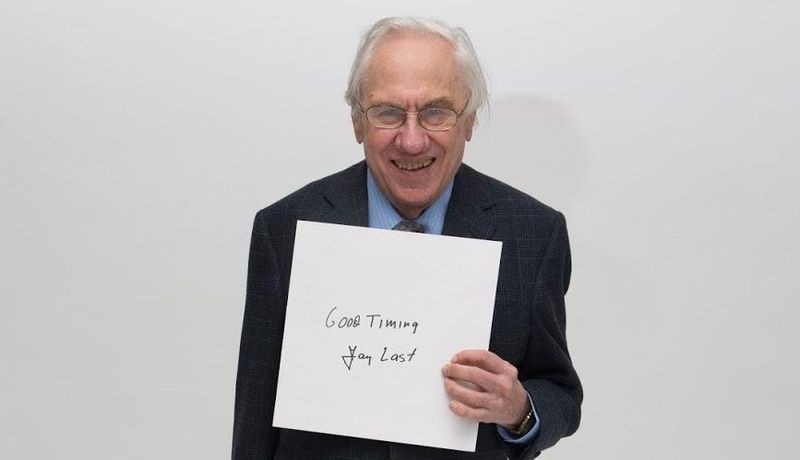
Jay Last shares his advice for entrepreneurs: “Good Timing”
Dr. Jay Last is a pioneer of the silicon integrated circuit, the foundation for the digital world. A MIT physics PhD, he joined the Shockley Semiconductor Laboratory in 1956. In 1957, Last co-founded Fairchild Semiconductor, where he built the first step-and-repeat camera with Robert Noyce, and led the team that produced the first planar integrated circuit. In 1961, he co-founded the semiconductor division of Teledyne and then served as Teledyne’s VP for Technology through the 1970s. He founded the Archeological Conservancy and is one of the world’s foremost collectors of African art.
Venture capital pioneer, lead investor for iconic companies of the Digital Age, and catalyst for Silicon Valley as a center of innovation and entrepreneurship.
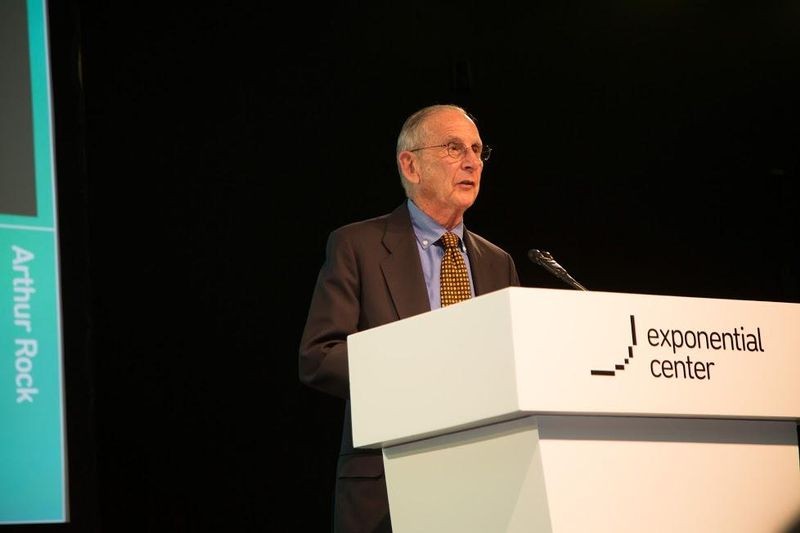
Pioneering VC Arthur Rock describes the key to success is not just being lucky, but “being lucky early”
Arthur Rock, founder of Arthur Rock & Co., is one of America’s earliest venture capitalists, a pioneer of investing in high-technology. As an investment banker in New York at Hayden Stone & Co., he spurred the founding of Fairchild Semiconductor in 1957. In 1961, Rock came to San Francisco, establishing his first venture capital partnership, Davis and Rock. In 1968, he created Arthur Rock & Co., which he still leads today. Rock’s notable investments include Teledyne, Scientific Data Systems, Apple, and Intel. A leader in Silicon Valley, Rock served on Intel’s board from 1968 to 1999.
Trailblazer in marketing the Digital Age, thought-leader for connecting people with transformative technologies, and spokesman for the Silicon Valley story.
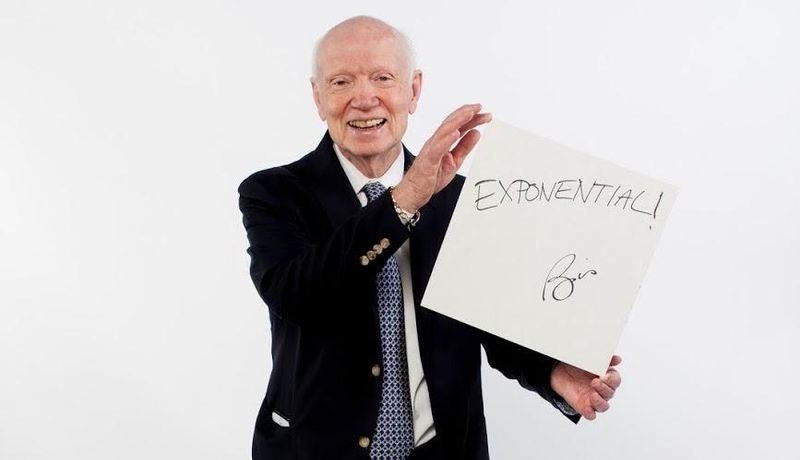
Marketing guru Regis McKenna gives his word of inspiration: “Exponential!”
Regis McKenna, founder of Regis McKenna, Inc., is Silicon Valley’s most influential figure in the marketing of high-technologies and their firms. He began his career in the 1960s, marketing cutting-edge silicon microchips at Fairchild spin-off General Microelectronics. From 1970, at his own firm, McKenna created new strategies and set new standards for the public communication of breakthrough technologies — the microprocessor with Intel, the personal computer with Apple Computer, recombinant DNA genetically-engineered medicine with Genentech, and others. A thought leader in marketing, he is author of numerous articles and books.
Innovator for the legal profession in the Digital Age, model partner and advisor for generations of entrepreneurs, and keystone of Silicon Valley enterprise.
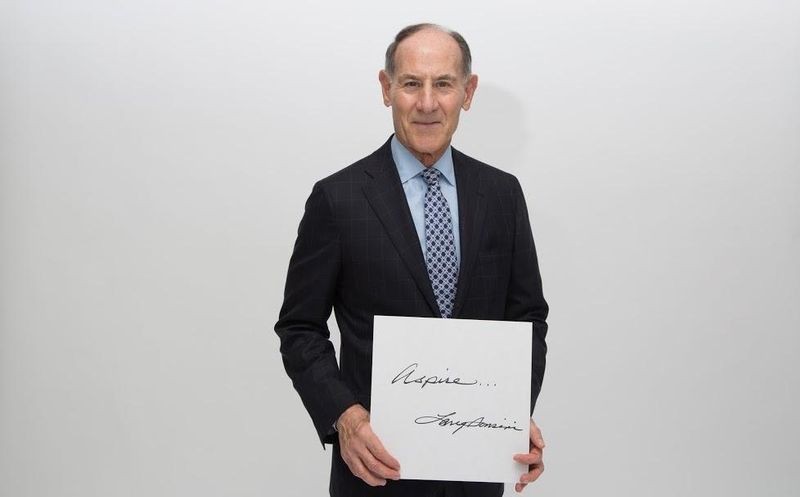
2016 honoree Larry Sonsini offers “Aspire” as inspiration for the next generation of change makers
Larry Sonsini, Chairman of Wilson Sonsini Goodrich & Rosati, is the most prominent lawyer in Silicon Valley, a pioneer of partnerships of legal experts with technology entrepreneurs. Since 1966, he has led WSGR’s rise to preeminence as a source of business advice and corporate law services. For five decades, Sonsini has been the legal advisor for the public offerings of legendary Silicon Valley companies, including Cypress Semiconductor, Apple, Netscape, Pixar, Google, and Tesla. He is a leading expert on corporate governance, advising organizations including the US Securities and Exchange Commission and serving on the board of the New York Stock Exchange.
Legendary venture investor, supporting partner of iconic entrepreneurs and firms of the Digital Age, change-maker seeking to build a better world.
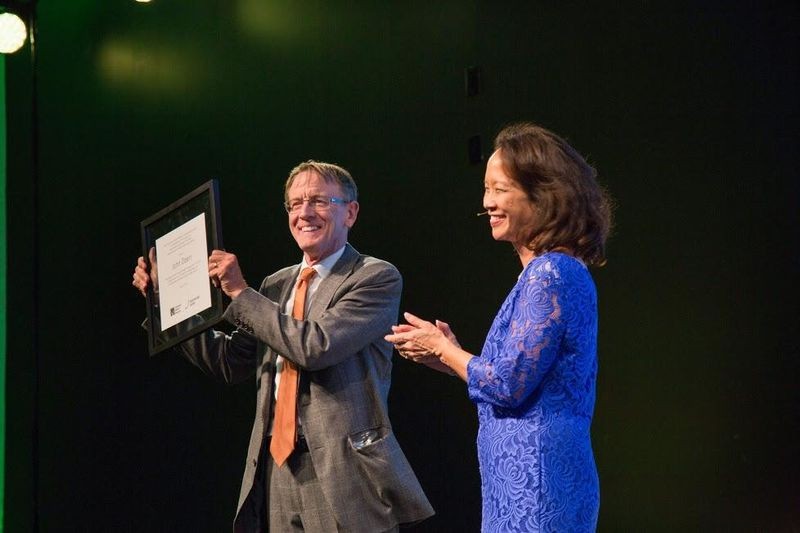
John Doerr holds high his citation, presented as part of “Celebrating the Founders and Builders of the Digital Age”
John Doerr, Chairman of Kleiner Perkins Caufield & Byers, is a legendary figure of Silicon Valley venture capital and among its most influential investors. Trained in electrical engineering, he came to Silicon Valley in 1974 and joined Intel to help grow its microprocessor business. Since 1980, at KPCB he has helped entrepreneurs create successions of the “Next Big Thing,” leading investments in key firms of the Digital Age including Compaq, Netscape, Google, Amazon, Intuit, Twitter, and Uber. Doerr also supports entrepreneurs focused on health, the environment, public education, and the alleviation of global poverty.